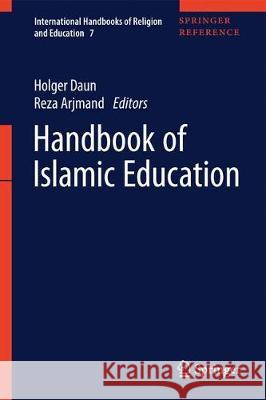Handbook of Islamic Education » książka



Handbook of Islamic Education
ISBN-13: 9783319646824 / Angielski / Twarda / 2018 / 952 str.
Handbook of Islamic Education
ISBN-13: 9783319646824 / Angielski / Twarda / 2018 / 952 str.
(netto: 2108,66 VAT: 5%)
Najniższa cena z 30 dni: 1465,09
ok. 22 dni roboczych.
Darmowa dostawa!
This Handbook traces and presents the fundamentals of Islam and their history and background, and provides a global and holistic, yet, detailed picture of Islamic education around the world.
Section I.- Introduction to Section I: Historical Perspective and the Origins and Foundations of Islamic Education; Reza Arjmand.- 1. Sharia in a Historical Perspective; Abdullah Saeed.- 2. Sunnism, Shi´ism, Sufism and Education; Abdullah Saeed.- 3. Philosophy of Islamic Education; Mujadad Zaman.- 4. Islamic Education and Development of Educational Traditions and Institutions; Yahia Baiza.- 5. Waqf and Islamic Economics of Education in the Muslim World; Reza Arjmand.- 6. The Learned Class (Ulama); Yahia Baiza.- 7. Ijaza – Assessment Methods in Islamic Education; Amina Tawsil.- Section II.- Introduction to Section II: Islam and Education in the Modern Era: Social, Cultural, Political and Economic Changes and the Responses from Islamic Education; Reza Arjmand.- 8. Colonialism, Post-colonialism, Islam and Education; Charlene Tan Hwee Thio.- 9. Changes in Muslim Orientation and Views on Education; Sherin Saadallah.- 10. Islam and the West: Clashes and Co-operations; Azkar Ibrahim.- 11. Islam, the State, Civil Society and Education; Florian Pohl.- 12. Women and Education in Muslim Context; Sherine Hafez.- 13. Islam, Sexualities and Education; Mariam Nagi.- 14. Islam and Democracy in Muslim Educational Settings; Antonia Mandry.- 15. Muslim International Non-Governmental Organizations and Education; Sameena Eido.- 16. Islam, Globalization and Education; Holger Daun and Reza Arjmand.- 17. Islamic, Education and ICT; Vit Sisler.- 18. Education of Religious Minorities in Muslim countries; Clinton Bennett.- 19. Islamic Fundamentalism, Terrorism and Education; Val D. Rust and Carine Allaf.- 20. The Enduring Challenge of Traditional and Modern Muslim Education at the Core and at the Periphery; Tahir Abbas.- 21. Migration, Diaspora, Muslim Transnational communities and Education; Reza Arjmand.- Section III.- Introduction to Section III: Islamic Education Around the World: Commonalities and Varieties in Islamic Education; Holger Daun.- Middle East: North Africa.- 22. Islamic Education in Iran; Reza Arjmand.- 23. Islamic Education in Egypt; Reza Arjmand.- 24. Islamic Education in Turkey; Elizabeth Özdalga.- 25. Islamic Education in Saudi Arabia; Shireen Abdul-Rahman A. Marghalani.- 26. Islamic Education in Morocco; Helen Boyle.- Sub-Saharan Africa.- 27. Islamic Education in West and Central Africa; Helen Boyle.- 28. Islamic Education in East Africa; Jonas Svensson.- 29. Islamic Education in South Africa; Yusuf Waghid.- Central Asia & Caucasus.- 30. Islamic Education in Afghanistan; Pia Karlsson and Amir Mansory.- 31. Islamic Education in Tajikistan; Hakim Zainiddinov.- South Asia/South East Asia & Pacific.- 32. Islamic Education in India; Mohammad Talib.- 33. Islamic Education in Pakistan; Val D. Rust and Lucas Arribas Layton.- 34. Islamic Education in Malaysia; Ahmad Fauzi Abdul Hamid.- 35. Islamic Education in Indonesia; Azyumardi Azra Syarif Hidayatulla.- 36. Islamic Education in The Philippines; Jeffrey Ayaloa Milligan.- 37. Islamic Education in China; Jadric Armijo.- Europe.- 38. Islamic Education in the Balkans; Amina Isanović Hadžiomerović.- 39. Islamic Education in France; Anna van den Kerchove.- 40. Islamic Education in the Nordic Countries; Joergen Baek Simonsen and Holger Daun.- 41. Islamic Education in England; J.M. Halstead.- 42. Islamic Education in The Netherlands; Ina ter Avest and Cok Bakker.- 43. Islamic Education in Eastern Europe; Maria Lagutina.- 44. Islamic Education in Russia; Maria Lagutina.- Americas.- 45. Islamic Education in United States; Nadeem Memon.- 46. Islamic Education in Latin America; Nikolay Dobronravin.- Islamic Higher Education.- 47. An International Islamic University - a Case Study; Adeel Khan.
Holger Daun is Professor of Comparative and International Education at Stockholm University, Sweden. He has been leading different research projects on globalization, education reform and parents´ educational strategies. He has published several books and a large number of book chapters and articles in scientific journals internationally. Mentioned could be made of Daun, H. and G. Walford (eds.) (2004) Muslim Educational Strategies in a Global Context. Brill Publishers; (2008) School Decentralization in the Context of Globalizing Governance: International Comparison of Grassroots Responses. Springer; Joseph Zajda and Holger Daun (eds.) (2012) Global Values Education: Teaching Democracy and Peace. Springer; and (2008) “Islam, Christianity and Secularism in European Education” in Journal of Policy Futures in Education.
Reza Arjmand is a senior lecturer at Department of Sociology, Lund University, Sweden. Reza has conducted a number of studies and published several books, articles and book chapters on Islamic education, education of Muslims at home and diaspora, everyday life of Muslims’ and Muslim urban life. Based on an empirical research, his latest book Public Urban Space, Gender and Segregation (Routledge 2016) studies the notion of space production and formation of the normative and ideologically-laden gender-segregated public spaces and its usage as an instrument for the Islamization of everyday life. In his most recent monograph, “Education of the Intimate: Sexuality and Education in Iran” Reza endeavours to explore methods of acquiring sexual knowledge among Iranian youth at the absence of an official sex education.
1997-2026 DolnySlask.com Agencja Internetowa
KrainaKsiazek.PL - Księgarnia Internetowa









